Under the right circumstances, there are some scenarios where failure really can be the “mother” of success. It may sound counterintuitive, but the best lessons – a failed relationship, an unfulfilling job, a missed resolution – can start with failure, if you make an effort to learn and grow from your mistakes.
When you’re younger, failures may seem to come more readily, and even when you learn from your mistakes, the consequences of your actions can follow you – particularly the financial kind. In 2020, student loan debt in America rose to a record-level $1.6 trillion, and many students carry the weight of the debt around with them for years after their studies have ended.
But are student loans the worst money mistakes young people make, and how often do these bad behaviors follow them into their first jobs and beyond? To find out, we surveyed over 1,000 people to understand the financial mistakes they believe they made as college students, as young professionals, and when moving out for the first time, as well as what they’ve learned from these “failures,” especially in light of the COVID-19 pandemic. Read on to see what we uncovered.
College Gaffs
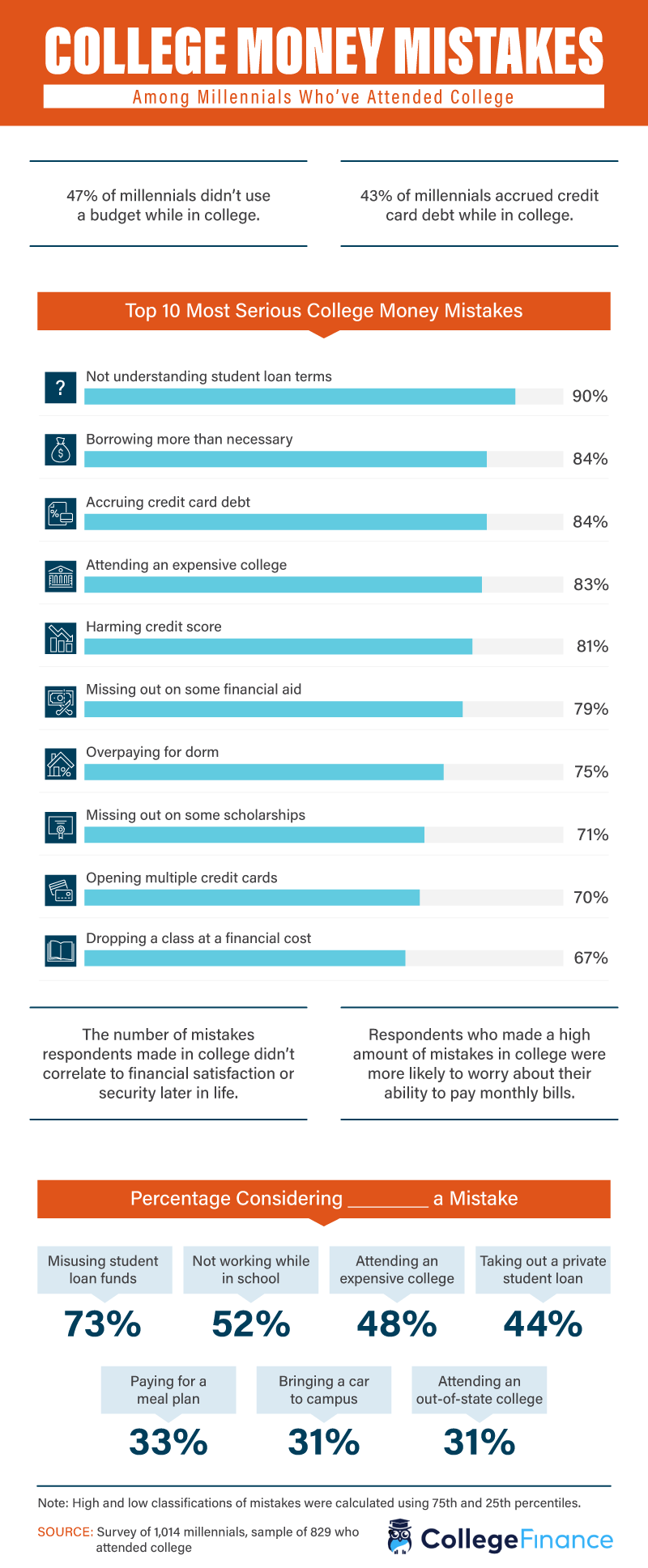
For many young people, college can be an exciting time. Increased autonomy and freedom mean you can study what you want and set your own schedule, and you might even have more financial liberty to open your first credit card and even take out student loans. Of course, that new found freedom can lead to more than a few financial mistakes along the way.
Among the more than 1,000 people polled, 47% of millennials didn’t use a budget while they were in college, and 43% accrued credit card debt while they were still in school. And while they might not have regretted using student loans to help finance their education, millennials still looked back on an aspect of their student loan experience as a failure. Overwhelmingly, 90% of millennials said not understanding their student loan led to a serious consequence, followed by borrowing more money than needed and accruing credit card debt (84% each).
And while the number of mistakes young people made while they were in college didn’t necessarily correlate to their financial stability later in life, those who made a higher number of these mistakes were more likely to worry about their ability to make ends meet. Nearly 3 in 4 students said misusing their student loans was a mistake (73%), followed by not working in school (52%) and attending an expensive college (48%).
Career Missteps
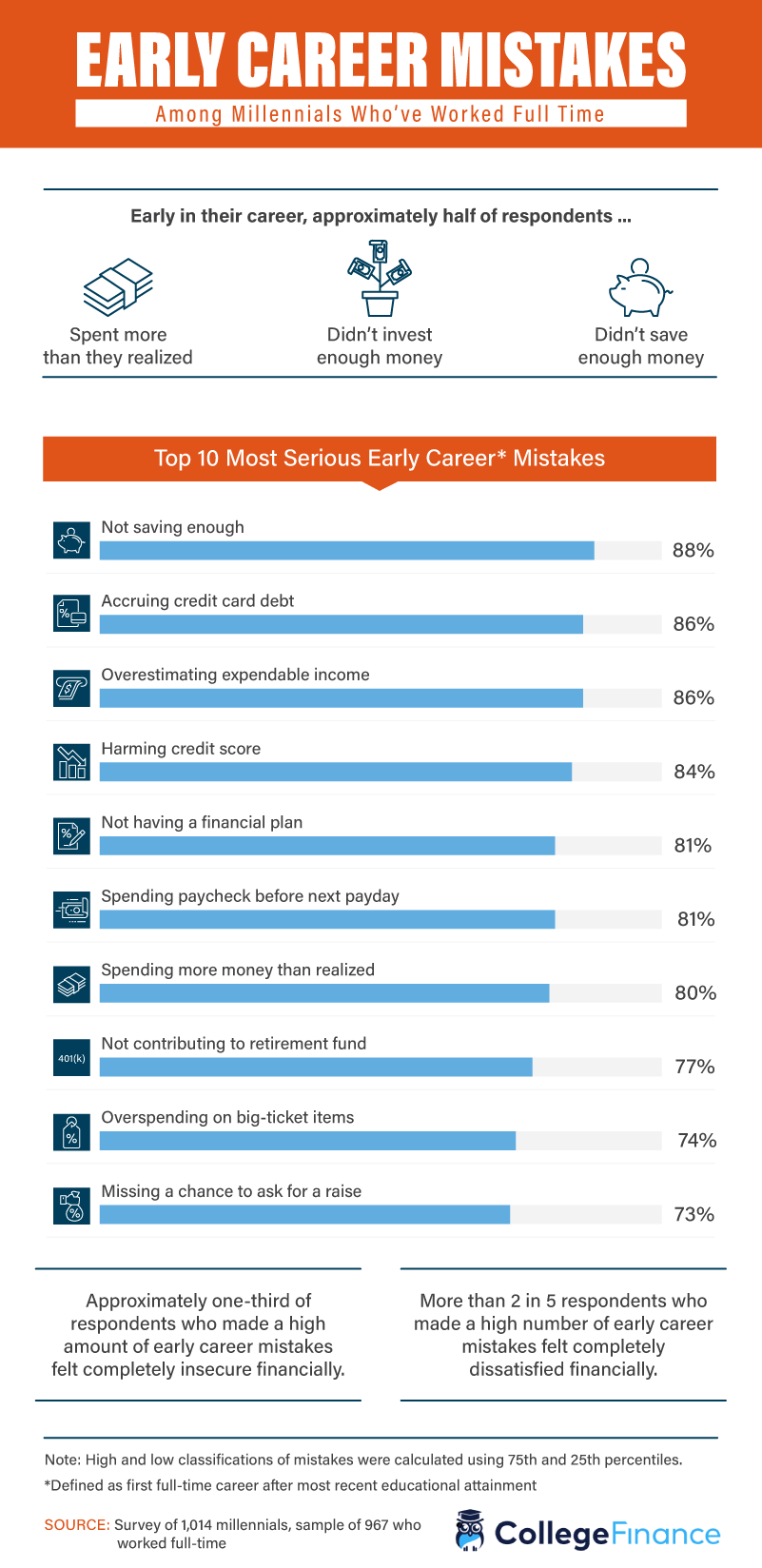
College students are the only group of people who occasionally make long-term financial mistakes. Even early in their careers, young people still reported spending and saving behaviors that left them learning from their history of trial and error.
Roughly half of young people acknowledged spending more money than they realized, not investing enough, and not saving too little in the early stages of their careers. Even if it feels like a lifetime away, experts recommend establishing saving habits in your 20s that can help set you up for success when it’s finally time to start thinking about retirement. According to the mistakes that led to serious consequences, millennials most commonly pointed to not saving enough money (88%), accruing credit card debt (86%), harming their credit score (84%), and not having a financial plan (81%).
Making financial mistakes may not be mitigated simply by securing a high-paying job fresh out of college. Nearly 1 in 3 respondents earning high salaries early in their careers felt completely financially insecure at the time of our survey. Another two in five respondents who reported a high number of mistakes early in their careers felt completely dissatisfied financially.
Cost of Living
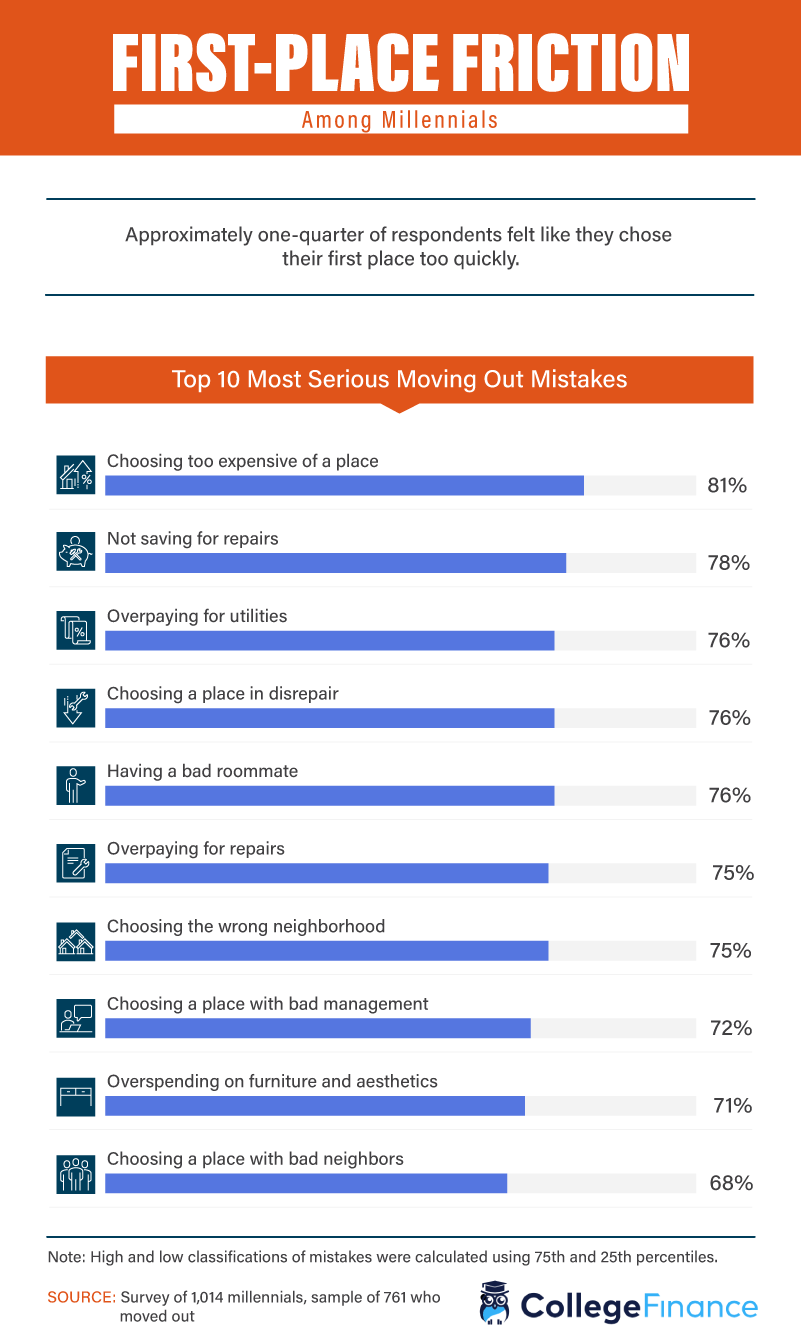
Moving out on their own is another common rite of passage for many young people, but when and how they opt to break away from the nest can lead to major financial mistakes.
Roughly 1 in 4 young people reported choosing a first home on their own too quickly, and more than 4 in 5 said choosing a place that was too expensive led to serious long-term consequences.
In addition to not saving money for repairs (78%), overpaying for utilities, choosing a place that needed too much work, and moving in with a bad roommate (76% each) were common mistakes young people had to live with. Depending on whether you’re renting in an apartment where repairs are managed for you or a home where you might be expected to pay for repairs yourself, the average home could require hundreds of dollars a month budgeted for repairs.
Financial Cause and Effect
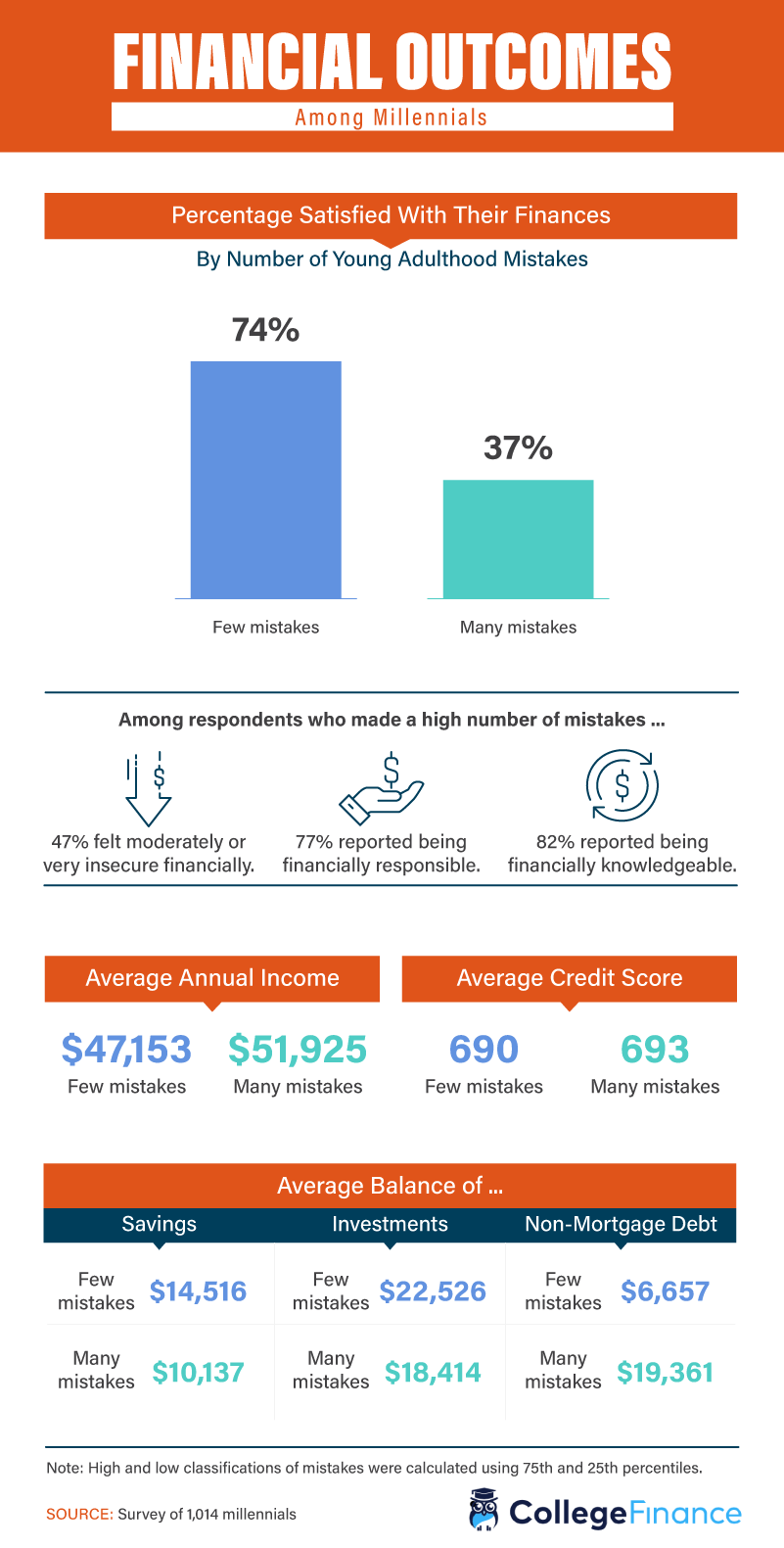
Mistakes present an excellent opportunity for learning and growth, but an excessive number of financial missteps when you’re young could lead to major money concerns later in life.
When asked if they were satisfied with their finances, 74% of people who’d made fewer mistakes at a young age responded positively, compared to just 37% of those who reported making many mistakes. Among those who’d made a higher number of these financial accidents, 47% acknowledged feeling moderately or very insecure financially, though 77% felt financially responsible, and 82% felt financially knowledgeable.
Even if they weren’t entirely satisfied with their current monetary standing, people who’d made more financial mistakes reported earning more than $4,500 a year over those who’d made fewer mistakes and had a higher credit score (693 on average) compared to those with fewer blunders under their belt (690).
They might earn more (and consider themselves fairly knowledgeable about their finances), but people who’d made fewer money mistakes averaged over $4,000 more in savings and investments.
Harboring Bad Behaviors
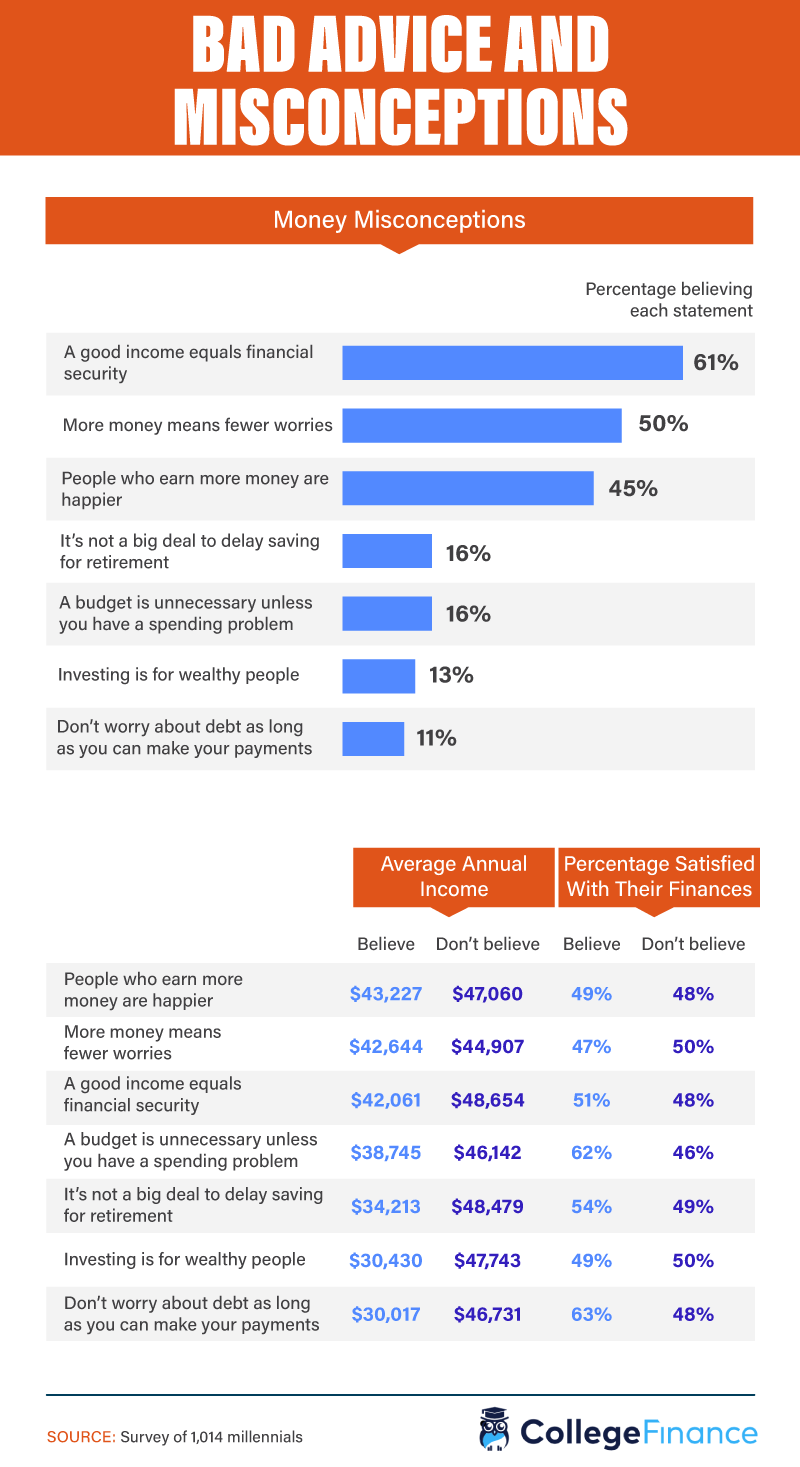
While 61% of people polled believe a good income equates to financial security, those who disbelieved that sentiment earned over $4,500 more on average. Half of Americans believed more money means having fewer worries, and another 45% said people who earn more money are happier. In both cases, people who recognized more money doesn’t equal more happiness or less worry also reported higher average incomes.
While just 16% of people suggested you only need a budget if you have a spending problem, people who disbelieved that sentiment earned nearly $8,000 more on average.
Avoiding Financial Mistakes
For millions of Americans, choosing to go to college is choosing to invest in your own future. And while the cost can be high, how you pay for college (and what you know about the student loan process) can have a profound impact on your financial standing for years to come. For many young people, not understanding the terms of their student loans, taking more money than needed, and using that money for more than just their education ranked as common mistakes with major consequences.
At College Finance, we know your education is an investment, and we’re committed to helping you make the best decisions for your future, financial or otherwise. With resources on how to plan for the future, everything you need to know about borrowing to pay for college, and answers to the questions you may not realize you have about how to repay your loans, College Finance is your one-stop shop for expert advice. No matter what stage you’re at in your college journey, College Finance has the tools you need to succeed. Learn more by visiting us online at CollegeFinance.com today.
Methodology and Limitations
For a majority of these findings, we surveyed 1,014 millennials using Amazon Mechanical Turk. 829 respondents had attended college, 967 had worked full time, and 761 had moved out of their childhood home. 521 respondents were male, 490 respondents were female, and two respondents did not identify as male or female. This study also includes findings from a survey of 1,000 current college students.
To help ensure that respondents took our survey seriously, all respondents were required to identify and correctly answer an attention-check question. In some cases, questions and responses were rephrased for clarity or brevity. These data rely on self-reporting, and statistical testing was not performed on these findings. Potential issues with self-reported data include, but are not limited to, exaggeration, selective memory, and attribution errors on the part of respondents.
Fair Use Statement
Want to help young people recognize the money mistakes they’re making before it’s too late? Share the findings of our study for any noncommercial use with the inclusion of a link back to this page as credit to our creative team of contributors for their work on this project.


